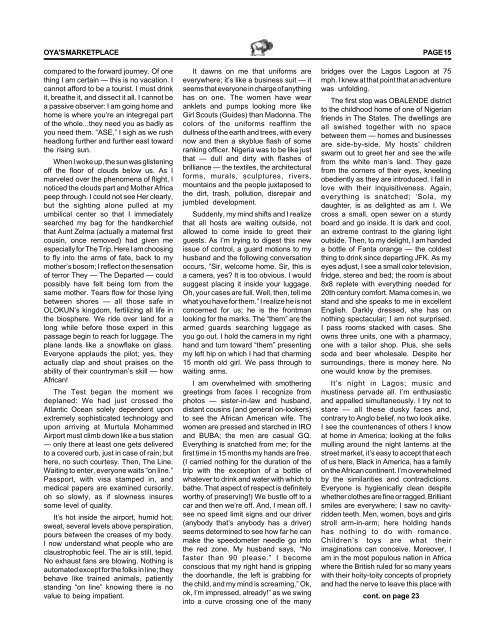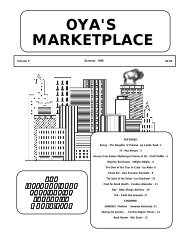OYA'S MARKETPLACE - Oya N'Soro
OYA'S MARKETPLACE - Oya N'Soro
OYA'S MARKETPLACE - Oya N'Soro
You also want an ePaper? Increase the reach of your titles
YUMPU automatically turns print PDFs into web optimized ePapers that Google loves.
<strong>OYA'S</strong> <strong>MARKETPLACE</strong> PAGE 15<br />
compared to the forward journey. Of one<br />
thing I am certain — this is no vacation. I<br />
cannot afford to be a tourist. I must drink<br />
it, breathe it, and dissect it all. I cannot be<br />
a passive observer: I am going home and<br />
home is where you’re an integregal part<br />
of the whole...they need you as badly as<br />
you need them. “ASE,” I sigh as we rush<br />
headlong further and further east toward<br />
the rising sun.<br />
When I woke up, the sun was glistening<br />
off the floor of clouds below us. As I<br />
marveled over the phenomena of flight, I<br />
noticed the clouds part and Mother Africa<br />
peep through. I could not see Her clearly,<br />
but the sighting alone pulled at my<br />
umbilical center so that I immediately<br />
searched my bag for the handkerchief<br />
that Aunt Zelma (actually a maternal first<br />
cousin, once removed) had given me<br />
especially for The Trip. Here I am choosing<br />
to fly into the arms of fate, back to my<br />
mother’s bosom; I reflect on the sensation<br />
of terror They — The Departed — could<br />
possibly have felt being torn from the<br />
same mother. Tears flow for those lying<br />
between shores — all those safe in<br />
OLOKUN’s kingdom, fertilizing all life in<br />
the biosphere. We ride over land for a<br />
long while before those expert in this<br />
passage begin to reach for luggage. The<br />
plane lands like a snowflake on glass.<br />
Everyone applauds the pilot; yes, they<br />
actually clap and shout praises on the<br />
ability of their countryman’s skill — how<br />
African!<br />
The Test began the moment we<br />
deplaned: We had just crossed the<br />
Atlantic Ocean solely dependent upon<br />
extremely sophisticated technology and<br />
upon arriving at Murtula Mohammed<br />
Airport must climb down like a bus station<br />
— only there at least one gets delivered<br />
to a covered curb, just in case of rain; but<br />
here, no such courtesy. Then, The Line.<br />
Waiting to enter, everyone waits “on line.”<br />
Passport, with visa stamped in, and<br />
medical papers are examined cursorily,<br />
oh so slowly, as if slowness insures<br />
some level of quality.<br />
It’s hot inside the airport, humid hot;<br />
sweat, several levels above perspiration,<br />
pours between the creases of my body.<br />
I now understand what people who are<br />
claustrophobic feel. The air is still, tepid.<br />
No exhaust fans are blowing. Nothing is<br />
automated except for the folks in line; they<br />
behave like trained animals, patiently<br />
standing “on line” knowing there is no<br />
value to being impatient.<br />
It dawns on me that uniforms are<br />
everywhere; it’s like a business suit — it<br />
seems that everyone in charge of anything<br />
has on one. The women have wear<br />
anklets and pumps looking more like<br />
Girl Scouts (Guides) than Madonna. The<br />
colors of the uniforms reaffirm the<br />
dullness of the earth and trees, with every<br />
now and then a skyblue flash of some<br />
ranking officer. Nigeria was to be like just<br />
that — dull and dirty with flashes of<br />
brilliance — the textiles, the architectural<br />
forms, murals, sculptures, rivers,<br />
mountains and the people juxtaposed to<br />
the dirt, trash, pollution, disrepair and<br />
jumbled development.<br />
Suddenly, my mind shifts and I realize<br />
that all hosts are waiting outside, not<br />
allowed to come inside to greet their<br />
guests. As I’m trying to digest this new<br />
issue of control, a guard motions to my<br />
husband and the following conversation<br />
occurs, “Sir, welcome home. Sir, this is<br />
a camera, yes? It is too obvious. I would<br />
suggest placing it inside your luggage.<br />
Oh, your cases are full. Well, then, tell me<br />
what you have for them.” I realize he is not<br />
concerned for us; he is the frontman<br />
looking for the marks. The “them” are the<br />
armed guards searching luggage as<br />
you go out. I hold the camera in my right<br />
hand and turn toward “them” presenting<br />
my left hip on which I had that charming<br />
15 month old girl. We pass through to<br />
waiting arms.<br />
I am overwhelmed with smothering<br />
greetings from faces I recognize from<br />
photos — sister-in-law and husband,<br />
distant cousins (and general on-lookers)<br />
to see the African American wife. The<br />
women are pressed and starched in IRO<br />
and BUBA; the men are casual GQ.<br />
Everything is snatched from me; for the<br />
first time in 15 months my hands are free.<br />
(I carried nothing for the duration of the<br />
trip with the exception of a bottle of<br />
whatever to drink and water with which to<br />
bathe. That aspect of respect is definitely<br />
worthy of preserving!) We bustle off to a<br />
car and then we’re off. And, I mean off. I<br />
see no speed limit signs and our driver<br />
(anybody that’s anybody has a driver)<br />
seems determined to see how far he can<br />
make the speedometer needle go into<br />
the red zone. My husband says, “No<br />
faster than 90 please.” I become<br />
conscious that my right hand is gripping<br />
the doorhandle, the left is grabbing for<br />
the child, and my mind is screaming,” Ok,<br />
ok, I’m impressed, already!” as we swing<br />
into a curve crossing one of the many<br />
bridges over the Lagos Lagoon at 75<br />
mph. I knew at that point that an adventure<br />
was unfolding.<br />
The first stop was OBALENDE district<br />
to the childhood home of one of Nigerian<br />
friends in The States. The dwellings are<br />
all swished together with no space<br />
between them — homes and businesses<br />
are side-by-side. My hosts’ children<br />
swarm out to greet her and see the wife<br />
from the white man’s land. They gaze<br />
from the corners of their eyes, kneeling<br />
obediently as they are introduced. I fall in<br />
love with their inquisitiveness. Again,<br />
everything is snatched; ‘Sola, my<br />
daughter, is as delighted as am I. We<br />
cross a small, open sewer on a sturdy<br />
board and go inside. It is dark and cool,<br />
an extreme contrast to the glaring light<br />
outside. Then, to my delight, I am handed<br />
a bottle of Fanta orange — the coldest<br />
thing to drink since departing JFK. As my<br />
eyes adjust, I see a small color television,<br />
fridge, stereo and bed; the room is about<br />
8x8 replete with everything needed for<br />
20th century comfort. Mama comes in, we<br />
stand and she speaks to me in excellent<br />
English. Darkly dressed, she has on<br />
nothing spectacular; I am not surprised.<br />
I pass rooms stacked with cases. She<br />
owns three units, one with a pharmacy,<br />
one with a tailor shop. Plus, she sells<br />
soda and beer wholesale. Despite her<br />
surroundings, there is money here. No<br />
one would know by the premises.<br />
It’s night in Lagos; music and<br />
mustiness pervade all. I’m enthusiastic<br />
and appalled simultaneously. I try not to<br />
stare — all these dusky faces and,<br />
contrary to Anglo belief, no two look alike.<br />
I see the countenances of others I know<br />
at home in America; looking at the folks<br />
mulling around the night lanterns at the<br />
street market, it’s easy to accept that each<br />
of us here, Black in America, has a family<br />
on the African continent. I’m overwhelmed<br />
by the similarities and contradictions.<br />
Everyone is hygienically clean despite<br />
whether clothes are fine or ragged. Brilliant<br />
smiles are everywhere; I saw no cavityridden<br />
teeth. Men, women, boys and girls<br />
stroll arm-in-arm; here holding hands<br />
has nothing to do with romance.<br />
Children’s toys are what their<br />
imaginations can conceive. Moreover, I<br />
am in the most populous nation in Africa<br />
where the British ruled for so many years<br />
with their hoity-toity concepts of propriety<br />
and had the nerve to leave this place with<br />
cont. on page 23



